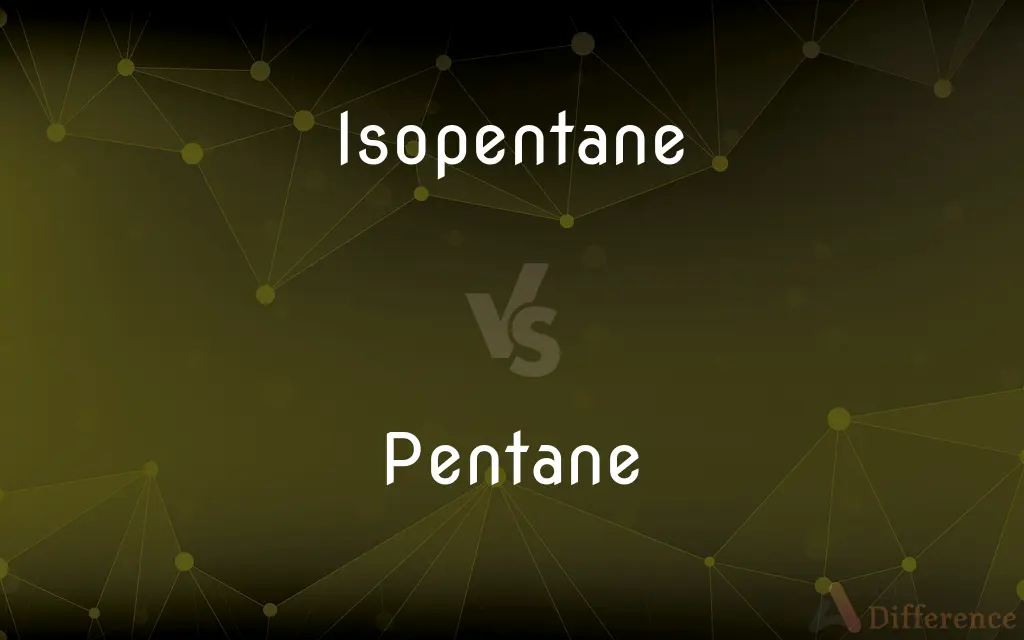Isopentane vs. Pentane — What's the Difference?
Edited by Tayyaba Rehman — By Maham Liaqat — Updated on May 3, 2024
Isopentane, a branched isomer of pentane, exhibits lower boiling points and enhanced volatility, while pentane, a straight-chain hydrocarbon, has higher density and boiling point.

Difference Between Isopentane and Pentane
Table of Contents
ADVERTISEMENT
Key Differences
Isopentane, also known as 2-methylbutane, is a structural isomer of pentane characterized by a branched chain. This structure significantly influences its physical and chemical properties, such as boiling point and reactivity. Whereas pentane has a linear molecular structure, which typically results in different interactions and stability compared to its branched counterparts.
The boiling point of isopentane is considerably lower, around 27.85°C, due to its branched structure which reduces molecular interactions. In contrast, pentane boils at a higher temperature of 36.1°C, as its straight chain allows for stronger intermolecular London dispersion forces.
In terms of usage, isopentane is often preferred in specialized applications such as a blowing agent in foam production or a refrigerant due to its volatility. On the other hand, pentane is widely used as a laboratory solvent and in the formulation of gasoline due to its relatively stable and non-reactive nature.
The density of isopentane is also lower, making it less suitable for some applications that require a denser liquid. Pentane, with its higher density, can be more effective in applications such as solvent extraction processes where heavier molecules are desirable.
Isopentane's branched structure makes it slightly more reactive in certain chemical reactions compared to pentane, which, due to its linear structure, often reacts differently under the same conditions.
ADVERTISEMENT
Comparison Chart
Structure
Branched chain
Straight chain
Boiling Point
27.85°C
36.1°C
Density
Lower
Higher
Reactivity
More reactive in certain conditions
Less reactive
Usage
Blowing agent, refrigerant
Laboratory solvent, gasoline formulation
Compare with Definitions
Isopentane
A branched-chain alkane with five carbon atoms.
Isopentane is used in the production of polystyrene foam.
Pentane
Higher boiling point than its isomers.
Pentane's boiling point affects its use in low-temperature applications.
Isopentane
A component of gasoline.
Isopentane enhances the volatility of gasoline.
Pentane
Less reactive compared to branched alkanes.
Pentane's reactivity is lower, making it safer for some chemical processes.
Isopentane
More reactive than pentane in some chemical reactions.
Isopentane can react more vigorously under certain conditions.
Pentane
A primary component in some fuels.
Pentane is blended into some gasoline formulations to adjust vapor pressure.
Isopentane
A volatile hydrocarbon used as a refrigerant.
Isopentane's low boiling point makes it suitable for refrigeration cycles.
Pentane
A straight-chain alkane with five carbon atoms.
Pentane is commonly used in organic synthesis.
Isopentane
Less dense than straight-chain alkanes.
Isopentane's lower density affects its application in solvent extraction.
Pentane
A laboratory solvent due to its non-polarity.
Pentane is ideal for dissolving non-polar substances.
Isopentane
Isopentane, also called methylbutane or 2-methylbutane, is a branched-chain saturated hydrocarbon (an alkane) with five carbon atoms, with formula C5H12 or CH(CH3)2(C2H5). Isopentane is an extremely volatile and extremely flammable liquid at room temperature and pressure.
Pentane
Pentane is an organic compound with the formula C5H12—that is, an alkane with five carbon atoms. The term may refer to any of three structural isomers, or to a mixture of them: in the IUPAC nomenclature, however, pentane means exclusively the n-pentane isomer; the other two are called isopentane (methylbutane) and neopentane (dimethylpropane).
Isopentane
(organic compound) An aliphatic hydrocarbon with the chemical structure CH2CH2CH(CH3)2; isomeric with pentane and neopentane.
Pentane
Any of three colorless, flammable isomeric hydrocarbons, C5H12, derived from petroleum and used as solvents.
Pentane
(organic compound) An aliphatic hydrocarbon of chemical formula C5H12; either of the three isomers n-pentane, methyl-butane (isopentane), and di-methyl-propane (neopentane); volatile liquids under normal conditions.
Pentane
Any one of the three metameric hydrocarbons, C5H12, of the methane or paraffin series. They are colorless, volatile liquids, two of which occur in petroleum. So called because of the five carbon atoms in the molecule.
Common Curiosities
What is the molecular formula of pentane?
The molecular formula of pentane is C5H12.
Why does isopentane have a lower boiling point than pentane?
The lower boiling point of isopentane is due to its branched structure reducing effective molecular interactions.
Can pentane and isopentane be interchanged in industrial applications?
Pentane and isopentane typically cannot be interchanged due to differences in physical properties and reactivity.
How does the structure of isopentane differ from pentane?
Isopentane has a branched structure, whereas pentane is a straight-chain hydrocarbon.
What is the density difference between isopentane and pentane?
Isopentane has a lower density compared to pentane.
Which is more reactive, isopentane or pentane, and why?
Isopentane is generally more reactive than pentane due to its branched structure.
What is the primary use of isopentane?
Isopentane is primarily used as a refrigerant and a blowing agent in foam production.
How does the volatility of isopentane affect its applications?
The higher volatility of isopentane makes it suitable for applications like refrigerants and aerosol propellants.
How does the usage of pentane in laboratories compare to isopentane?
Pentane is more commonly used as a solvent in laboratories due to its stability and non-reactive nature.
What is the environmental impact of using pentane in industrial applications?
The use of pentane in industries can lead to emissions of hydrocarbons which contribute to air pollution and smog.
Are there environmental concerns associated with the use of pentane?
Yes, pentane can contribute to volatile organic compound emissions, impacting air quality.
What role does isopentane play in gasoline?
Isopentane is added to gasoline to improve its volatility and combustion characteristics.
What safety measures are recommended when handling isopentane?
Proper ventilation and avoiding open flames are crucial due to isopentane's volatility.
Is pentane toxic?
Pentane is considered a less toxic hydrocarbon but can cause respiratory and nervous system effects if inhaled in large quantities.
Can isopentane be used in pharmaceuticals?
Isopentane can be used in the pharmaceutical industry, typically in the production of medicinal aerosols.
Share Your Discovery

Previous Comparison
Unironic vs. Irony
Next Comparison
Leader vs. ChampionAuthor Spotlight
Written by
Maham LiaqatEdited by
Tayyaba RehmanTayyaba Rehman is a distinguished writer, currently serving as a primary contributor to askdifference.com. As a researcher in semantics and etymology, Tayyaba's passion for the complexity of languages and their distinctions has found a perfect home on the platform. Tayyaba delves into the intricacies of language, distinguishing between commonly confused words and phrases, thereby providing clarity for readers worldwide.
















































